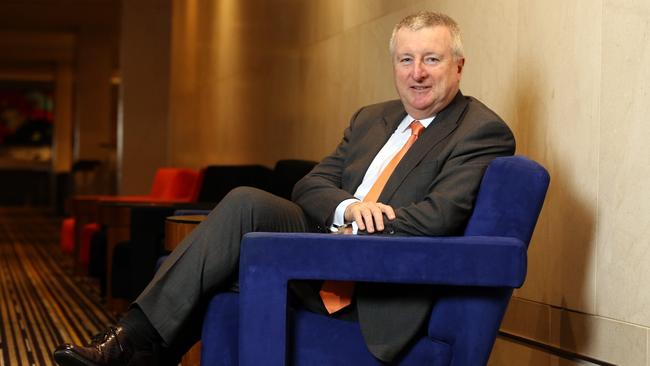Logistics legend Michael Byrne saw women change the sector
The changing role of women in the workforce in Australia has driven major structural shifts in the logistics business, according to Michael Byrne, the former chief executive of Linfox and Toll.

The changing role of women in the workforce in Australia has driven major structural shifts in the logistics business, according to Michael Byrne, the former chief executive of Linfox and Toll.
“Female participation in the workforce has changed supply chain and delivery patterns,” said Mr Byrne, who has been made a Member of the Order of Australia (AM) in the Australia Day Honours for his services to transport and the community.
“When I started (in the logistics business) there was no Sunday shopping, and no Saturday afternoon shopping,” he said.
“You didn’t have Woolworths opening from seven in the morning until 10 at night.
“That all changed because of female participation in the workforce. It changed our delivery methods.”
By the time he was running Toll, from 2017 to 2020, almost 40 per cent of the company’s work was done overnight delivering goods to stores so they could open early in the morning.
“Saturday, which used to be the smallest shopping day of the week, became the largest because women were working during the week.”
Mr Byrne, who grew up in the southern suburbs of Sydney, has been working in the sector since he was 12, when his mother took over the family trucking business after the death of her father.
In his twenties, he went to work for Mayne Nickless, where he held senior roles.
He had 4000 people working for him at the age of 27 before moving to Melbourne to work for businessman Sam Tarascio, running his Westgate logistics business from the age of 31.
At the age of 35 he was hired by trucking magnate Lindsay Fox to run a division. He was promoted about five years later, in 2006, to run the Linfox business – a role he held until 2014.
He became chief executive of equipment hire company Coates from 2014 to 2016 and managing director of the Toll Group in 2017 after it was bought by Japan Post.
His current roles include chairing the Australian Transit Group, being a member of the federal government’s National Transport Commission, and a director of National Intermodal, Sydney Airport, NSW Ports, Ausgrid and Perth-based grain growers co-operative CBH.
He is also a director of Britain’s second largest ports group, Peel Ports UK, representing AustralianSuper, which owns 32 per cent of the company.
During the pandemic the Morrison government sought his advice on export supply chains as the co-ordinator general for international freight, which focused on bringing supplies into Australia by air. Mr Byrne said the logistics industry had never done a great job of selling itself as a sector to work in, despite being a global business with opportunities to work around the world.
He said the face of the industry had changed considerably from its early “blue singlet, stubbies and thongs” image to a place that now attracted many senior women.
“Female participation has changed our industry,” he said.
“There have been a lot of fantastic women who have got to the level of chief executive in the industry,” he said.
These included former Linfox Logistics chief executive Annette Carey, former Australia Post chief executive Christine Holgate, who now runs Team Global Express, former Linfox senior executive Kylie Fraser and NSW Ports chief executive, Marika Calfas.
During the pandemic, Mr Byrne worked with Air Vice-Marshal Margaret Staib, the former chief executive of Airservices Australia, who was appointed as the federal government’s freight controller.
“There are a lot more women running businesses in supply chain and logistics businesses,” he said.
“When I came through the graduate program at Mayne Nickless, when I was 23, there were 11 men in it.
“It wouldn’t happen these days. The big graduate programs which Linfox and Toll would be running now would be about 50 per cent women.”
Mr Byrne said the logistics industry should work harder to promote itself as a sector offering a range of roles, from engineers to mathematicians to warehouse managers.
“There is an enormous breadth and range of jobs,” he said.
“You don’t only have truck drivers.
“It’s incredibly dynamic. You are competing globally every day. Supply chains are a global phenomenon.’’
Mr Byrne said his career saw him live all in many places including Sydney, Melbourne, Thailand and the US, where he also did three degrees.
His advice to people starting out in their career is to be ready to take the jobs which no one else wants.
“Don’t always look for the nicest jobs,” he said.
“Some of my career was built on being prepared to do the worst, ugliest jobs.”
He said workers needed to be prepared to continuously upgrade their skills and expertise.
“I went back to university three times,” he said.
Mr Byrne has also been active in surf lifesaving, having been involved for many years with Elouera Surf Club in the southern Sydney suburb of Cronulla for many years.
“I’ve had some big jobs around the world, working for some amazing people including Lindsay Fox and the Fox family, Bill Kelty and the Stokes family (which bought Coates).
“I played soccer for 48 years and cricket for 38 years and I have been in the surf club for a long time.
“My wife and I and our kids still (do surf) patrol.
“It is important if you have some big jobs to still be involved in the community where someone’s whispering in your ear all the time that you’re just a bloke from The Shire.”







To join the conversation, please log in. Don't have an account? Register
Join the conversation, you are commenting as Logout